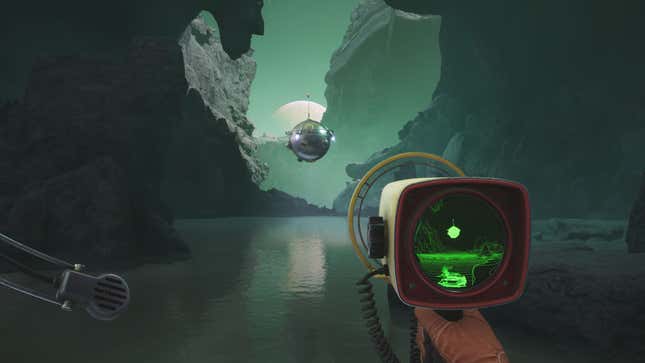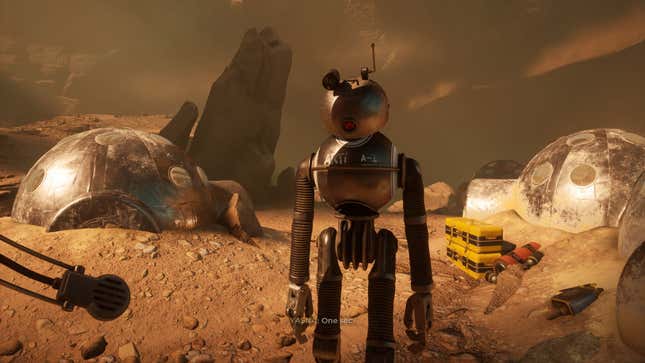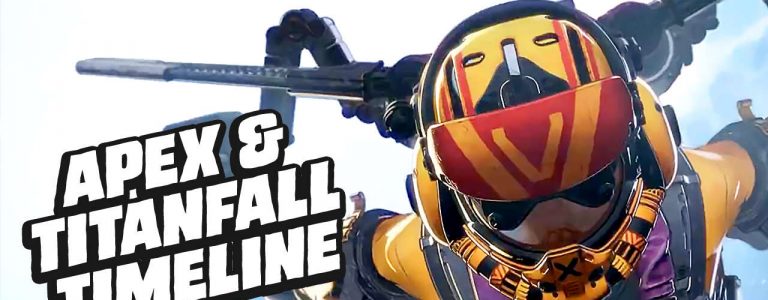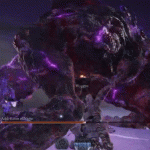God, science fiction is great, isn’t it? It’s a testament to the incredible brilliance of human beings that we have imaginations that stretch out into the cosmos, and feel this innate drive to explore the complexities of our own humanity through the allegory of unrealized technology. Which is to say, I’ve come out of the story-driven adventure The Invincible (see on Amazon), in that heady space of intelligent fantasy.
I’m not going to pretend to have read any of Polish science fiction master Stanisław Lem, but I have at least seen both the 1972 and 2002 film versions of his most famous novel, Solaris. However, having played this game based on his 1964 novel, The Invincible, I’m sure as hell going to start reading them. (Oh who am I kidding—I’ll download them on Audible.)
The term “walking simulator” still seems grimly bogged down by a pejorative misinterpretation, so I use it carefully to describe Polish developer Starward Industry’s extraordinary recreation of this tale of planetary exploration, nanotechnology, and the human drive for survival. In fact, the game it most reminded me of mechanically is the best of the form—2016’s Firewatch. The Invincible features the same all-consuming sense of occupying another person’s body, the weight of their movement, the struggle of their climbing, and the tiredness in their plight. In this case, that body belongs to astrobiologist Dr. Yasna, a member of the crew of the Dragonfly, a Commonwealth exploratory ship that has made an unscheduled stop at the planet Regis III.
The Commonwealth has got word that mortal enemies The Alliance are sending one of their flagships, The Invincible, to Regis III, and happening to have a ship nearby, rerouted its crew to find out why this planet is of interest to their enemies. Yasna, however, had no need to reach the surface, given the planet shows no sign of biological life, so remained on board.

All this makes the game’s opening, with Yasna lost and alone on the planet, struggling to find her way to a base camp she can’t remember ever visiting, certainly intriguing. And yes, while this is an amnesia opening, I’m relieved to be able to tell you that not only is it narratively justified in an important way, but also sets the stage for some great storytelling. Triggered memories appear in playable flashbacks, which unveil the tale in a far more compelling way than the alternative option of an expositional opening dump.
Those who have read the book will already be sat upright, confused about what’s going on. Yes, this game does present the story from a strikingly different perspective of that in the novel. It’s a decision that allows the game’s story to spring some surprising reveals on those unfamiliar with the original text, while still eventually marrying up.
I’m reluctant to get into what that story actually is, given I went in with no knowledge at all, and don’t really want to rob you of the same. What’s apparent from the opening moments, however, is that Regis III is a peculiar place, riddled with unexplained metallic root systems and overground protrusions, as well as plant-like metal growths. And they don’t seem to be too good for you—get too close and your vision turns blurry, your brain fogs, and memories start to slip.

What follows is a fascinating exploration of humanity, evolution, and life’s drive to persist in the universe. Your primary role is to keep moving Yasna through the story, pressing forward against the odds, against her own diminishing spirit, and deeper into the planet’s mysteries. And by that, I very literally mean “pressing forward.” Such is the walking simulator, and it’s important to go in not expecting a thrill-ride, no shoot-outs with gargling aliens, nor intricate puzzles to solve. This is about experiencing a great piece of science fiction, bending its nature by the answers your Yasna gives to questions she faces.
Those questions are fascinating, and like Firewatch, can be answered or ignored as you choose. Exploration also allows for a fair amount of freedom, with alternative avenues and diverting dead ends to find if you choose to veer from the map’s guidance. It is, however, slow-moving. Especially on foot.
Oh, and there’s too much of it. It certainly feels a bit strange to complain that this eight-hour game runs too long, but some editing would have been welcome. There are a few protracted sections that play out very similarly, with not enough intrigue or interaction, where I felt the pace grind and a sense of slog slide in. The Invincible is a strong eight-hour game, but could have been a brilliant six-hour ride.
Fortunately, much of this is mitigated by some stunning acting. Daisy May voices Yasna’s thousands of lines of dialogue, and her performance gripped me throughout. She doesn’t put a foot wrong with such a complex character, and given her only previous voice acting gig was playing Ami Anderson in Ubisoft’s Steep, hopefully will have a lengthy career launched by this role. More familiar are Jason Baughan (Evil West, Everybody’s Gone To The Rapture, and voice-over director on many more) and Derek Hagen (Control, Hitman 3), but every actor is top-notch here.
And the whole game is endlessly beautiful. Brilliant design choices have led to a game conceived with a 1950/60s retrofuturistic aesthetic, complete with rayguns, clunky robots and Mid-Century Modern furniture. Set against boldly colorful vistas, there isn’t a single moment where this game doesn’t look like the tattered paperback cover of a classic sci-fi novel.

If only it were slightly smoother, slightly shorter, and less buggy. While the developers are working on patches, there are glitchy moments throughout (especially weird strobing and flickering of some textures), and I hit a serious game-ending bug that—ironically—prevented me seeing the end of the game. It’s a known issue on PC, only affecting very few, and is apparently almost fixed, but still disappointing. I was, as it happens, able to reload and make a significantly different decision, and see an entirely different ending for a sense of closure. I also enjoyed the game enough to be willing to wait for the patch, and go back to see what I would have seen.
The Invincible is the rarest of video gaming treats: a really good science-fiction story. It explores philosophically challenging subjects, with a light touch for heavy topics, even as it covers well-worn sci-fi tropes of questioning our insatiable need to succeed and dominate (which, in fairness, were tropes being invented by Lem and his peers when the novel was written). Like Andrei Tarkovsky’s Solaris, it’s relentlessly compelling despite its pacing and flaws. (People who pretend that brilliant film isn’t achingly difficult to watch aren’t fooling anyone but themselves.)
Go in knowing this is a slow-paced, methodical game, and don’t demand that it be something else. But also, if you’re playing on PC, perhaps wait for the first big patch.
























